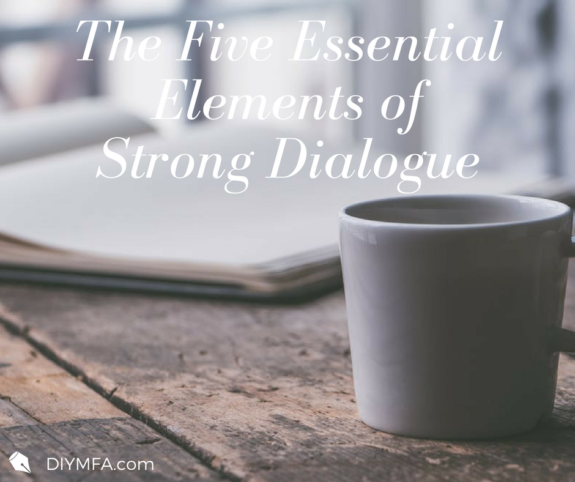Rick Kerb’s Little Miss Sunshine (featuring Alan Arkin, Steve Carell, and Abigail Breslin) won the Oscar for best original screenplay in 2007, and for a good reason. Not only does this film follow a cast of colorful characters, the story also thrives on sharp, engaging dialogue rich with tension.
But what can screenwriting teach fiction writers about dialogue? Aren’t scripts and novels…like Hemingway’s iceberg theory insinuates…completely different? In some ways yes, but that doesn’t mean we fiction writers can’t learn a thing or two from a film that thrives on conversation as much – perhaps arguably more than — action and events.
Objective
Analyze the old diner scene from Little Miss Sunshine to study engaging, important dialogue.
Resource
Little Miss Sunshine (screenplay by Rick Kerb)
Setting the Stage
I learned a lot of tips about writing scripts my sophomore year of college, but one lesson in particular always stood out. The professor opened the class with a clip from Little Miss Sunshine: The diner scene.
Little Miss Sunshine is a story about a dysfunctional family in their attempt to overcome numerous setbacks on an 800-mile road trip to the finals of the “Little Miss Sunshine” beauty pageant. In one scene, the family stops for breakfast and Sheryl, the mother, says each person can spend up to four dollars.
The characters respond with various different choices. But first, let’s get to know who each character is before analyzing the conversation that unfolds after they order.
The Characters
- Olive – The young daughter in the family. She is an innocent, slightly plump seven-year-old obsessed with Miss America. Although, she is part of an ensemble, Olive never actively opposes another character. She is, in essence, the one character everyone in the family loves.
- Richard – The father. He is a failed motivational speaker obsessed with perfection. He often fears that his family will end up losers, and all of his actions and behaviors tend to thrive on this fear.
- Dwayne – the son and elder sibling in the family. He is an intelligent but troubled teen who has taken a Nietzschean vow of silence until he becomes an air pilot.
- Grandpa – A foul-mouthed drug addict and Olive’s pageant coach. He lives with the family after getting evicted from his nursing home for snorting…but despite his addiction, he loves his granddaughter and wants only the best for his family.
- Sheryl – The mother. She is an overworked and resentful wife, worried sister, and a loving mother who depends on cigarettes to quiet her nerves.
- Frank – Sheryl’s brother. Frank moves in with the family after he tries to commit suicide. He is a homosexual Proust scholar who feels empty and lost after his ex-lover moves on to be with another man and his nemesis is awarded something he believes he deserves.
So there you have it, a cast full of opposition. Which brings me back to the conversation we will study today…the old diner scene when Olive orders ice cream and waffles for breakfast.
INT. OLD DINER – MORNING
RICHARD
Olive, can I tell you something about ice cream?
(she nods)
Ice cream is made from cream, which comes from cow’s milk. And cream has a lot of fat in it…
SHERYL
Richard…
RICHARD
What? She’s gonna find out anyway. Right?
OLIVE
Find out what?
RICHARD
Well, when you eat ice cream, the fat in the ice cream becomes fat on your body…
SHERYL
Richard, I swear to God…!
OLIVE
What? What’s wrong?
SHERYL
Nothing, honey. Nothing’s wrong.
RICHARD
So, if you eat a lot of ice cream you’re gonna become big and fat. But if you don’t you’ll probably stay nice and skinny.
Sheryl puts her head in her hands.
GRANDPA
Olive, Richard’s an idiot. I like a woman with meat on her bone.
Olive is confused.
OLIVE
I don’t…Mom! Why is everyone upset?
SHERYL
I’m not upset, honey. I just want you to understand: It’s okay to be skinny, and it’s okay to be fat, if that’s how you want to be. Whatever you want – it’s okay.
Richard rolls his eyes.
A Quick Side Note
So what can we learn from this scene? Richard convinces Olive not to eat her ice cream after proposing a question about the weight of Miss America winners. I’m going to go out on a limb here and guess that you’re pretty furious with Richard, right? I mean, who tells a seven-year-old to watch her weight? Let her eat the darn ice cream!
But remember, Richard’s character is obsessed with perfection and fears any any member in his family becoming a loser.
Does this mean he thinks Olive is a loser? No, just that he loves her and wants to protect her from failing at her dream. But what does failure mean anyway? Being overweight? Losing in her pageants? Can we even define failure? The answer is something viewers will need to watch the film to find out.
Back to the Scene – After the meals are delivered
OLIVE
Does anyone want my ice cream?
Sheryl just closes her eyes. Grandpa jumps in.
GRANDPA
Yeah, I’ll have a bite. You mind? Dwayne? Frank? Olive’s giving away her ice cream here.
Dwayne and Frank quickly snap to.
FRANK
Mind if I have a little?
Olive shakes her head. Frank and Swayne dig in. Even Sheryl gets in on the act. Richard is not amused.
GRANDPA
(loudly)
Boy, this is good ice cream! I feel sorry for the people at the table who aren’t enjoying delicious ice cream early in the morning.
OLIVE
Wait. Don’t take it all! Stop!
Olive picks up her spoon, fights them off. She takes a bite.
RICHARD
Olive…
SHERYL
Richard!
She glares at him, ferocious. Richard shuts up.
Five Elements of Strong Dialogue
There are five awesome things that this scene can teach us about dialogue. Let’s see how the dialogue develops throughout the scene, and how it shows these five strengths.
1) It is essential to the story
Dialogue should do one of three things: a) advance the plot, b) reveal something about the character, and c) reflect the theme. In this scene from Little Miss Sunshine we see all three elements at play, but none more so than how dialogue reveals character and character relationships.
Dialogue should be different for each character. In other words, each character should sound different. For instance, Sheryl is quick to argue with Richard about his criticism of Olive’s meal choice, but she must be cautious in how she speaks to Richard in front of Olive, who keeps asking “what’s wrong?”
Meanwhile, Grandpa – Richard’s father – is the only person to initially support Sheryl in her quarrel, but in a quite different, far more abrupt manner: “Richard’s an idiot.” We can guess from the differences in how these characters combat Richard that they tackle uncomfortable issues in quite different manners.
In novel writing, you might also use dialogue to advance the plot by clarifying something about background or. In other cases, you might use dialogue to illuminate a theme from conversations (think “To Kill a Mockingbird” and Atticus’s comment about walking in someone else’s skin), so long as you’re not heavy handed about this.
2) It imparts information
When characters talk to one another, dialogue should impart information, but never in a way that sounds obvious.
So what are we learning in this scene? Well, that Richard is so obsessed with winners and losers that he manipulates Olive’s desire to eat ice cream out of fear it will lead to her becoming a loser. It also shows that the whole family clearly, does not agree with Richard’s comments.
This scene imparts information from one character from another. It doesn’t explain the plot, but, rather, the flaws and dislikes of the characters.
3) It has conflict or tension
Alfred Hitchcock had a famous axiom: “What is drama but life with the dull bits cut out.” All dialogue should contain tension and conflict. I think this one is self explanatory in the scene from Little Miss Sunshine, with every character except for Olive opposing Richard.
Ever read a scene without tension or conflict? It’s not very exiting, isn’t it? Tension and conflict in drama will avoid the number one sin for writers – don’t sound dull.
Of course, various scenes will contain different levels of tension and conflict. You just need to decide what scenes should elevate more tension than others.
4) It is compressed
What does compressed mean? Basically, don’t bloat your dialogue.
We’re not longer writing in the ninetieth century, so works like Dickens aren’t as wildly embraced by today’s readers. This does not suggest that authors like Dickens aren’t brilliant – of course they are! But writers today can’t drown readers in excessively heavy monologues. Instead, if you must write a speech, break it up.
5) It is rich on subtext
Much like in life, what is unsaid is often just as important as what is not said. The layers beneath the surface of lines consist of story, character, and theme. Look familiar? That’s right: once again we tap into the essentials of writing dialogue, and how words define these three elements in a conversation.
Look back at the scene from Little Miss Sunshine. Sheryl, furious at Richard, keeps her words short and direct (“Richard!”) in order to appease Olive’s worry that something “wrong” is happening. Meanwhile, Frank and Dwayne remain quiet in their disgust, but eagerly jump in to support Grandpa as he digs into that bowl of ice cream.
Final Thoughts
Dialogue is essential for creating a character, scene, and theme. Although there is no one-way-fits-all method, these five points can strengthen your dialogue. If you have a spare moment, study a movie or read a script. Movies are, after all, dominated by conversations – so studying script will only heighten your awareness!
How do you include tension in your dialogue? Do you have any tips on making characters sound unique? Are there any movies you absolutely love because of the clever conversations? What lines usually stand out? Use the #LetsTalkBooks in the comments below if you found this column interesting and would like to continue the conversation!
 Abigail K. Perry is a commercial fiction writer living in Massachusetts where she teaches creative writing and film production. She received her B.S. in TV, Radio, and Film from Syracuse University and her Master’s in Education from Endicott College, and has worked as a creative production intern in for Overbrook Entertainment and as a marketing and sales intern for Charlesbridge Publishing.
Abigail K. Perry is a commercial fiction writer living in Massachusetts where she teaches creative writing and film production. She received her B.S. in TV, Radio, and Film from Syracuse University and her Master’s in Education from Endicott College, and has worked as a creative production intern in for Overbrook Entertainment and as a marketing and sales intern for Charlesbridge Publishing.
In addition to writing, Abigail plans to teach screenwriting at An Unlikely Story (the priceless local bookstore owned by Diary of a Wimpy Kid’s Jeff Kinney) in Plainville, MA. This class is in development and will launch soon!
Abigail is a member of the DIY MFA street team and a loyal follower of Writer’s Digest. You can read more about her work on this website or follow her on Twitter @A_K_Perry







